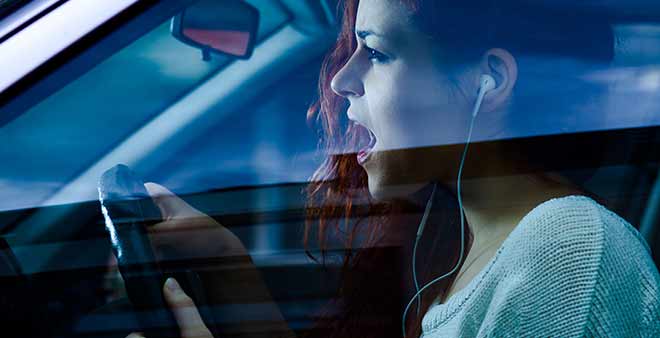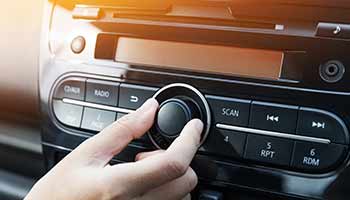
What Is The Law Regarding Driving With Headphones On?
Rhode Island is one (1) of four (4) states that makes it illegal for drivers to wear headphones while driving with only a few exceptions. The law includes provisions for emergency vehicle operators, motorcyclists with a headset installed in a helmet, persons using a headset that only covers one ear and persons using hearing aids to improve hearing. If a police officer finds that a person is wearing headphones while driving, and it does not fall under the provisions stated above, a person could be fined up to $140.
What Makes Wearing Headphones While Driving Dangerous?
When wearing headphones while driving, it greatly deteriorates your sense of sound. Many may question why sound is important when driving since you only need your eyes to see. Well, some headphones block out noise entirely, which can be dangerous because hearing a “beep” or someone yell or a crash can be the indicator your brain needs to prevent further damage to yourself or others.
Some specific scenarios include:
 Difficulty Hearing Emergency Vehicles – An ambulance or fire truck could be approaching and you may not hear them. By the time you see them, it may be too late to effectively move out of the way. This can cause a delay for them in emergency situations and it creates a public safety hazard.
Difficulty Hearing Emergency Vehicles – An ambulance or fire truck could be approaching and you may not hear them. By the time you see them, it may be too late to effectively move out of the way. This can cause a delay for them in emergency situations and it creates a public safety hazard.- Unable To Hear Crashes – There could be a crash happening outside of your field of vision that you likely cannot see but you would hear it. Hearing the crash gives drivers the proper time to adjust their driving to successfully navigate the potentially hazardous roads.
- Cannot Diagnose Issues With The Vehicle – Certain issues pertaining to a vehicle are purely auditory and would go completely unnoticed if wearing headphones while driving. Grinding and slipping noises may occur and the driver would never know. This could put the vehicle in serious danger of being damaged, costing the operator time and money.
What Are Some Alternatives To Headphones While Driving?
Some safe and legal alternatives to driving with headphones may include:
- Wear a Headset That Only Covers One Ear – This allows the driver to have an available ear open for traffic related sounds, while safely keeping both hands on the wheel. A popular example would be a Bluetooth Headset.
- Have The Phone Come Through The Car Speakers – While car speakers can get loud, headphones are considered more dangerous, since all outside noise is canceled out by both ears being blocked. You can either plug in your phone to your car using an audio cable or have the phone connect via Bluetooth to your cars stereo system. The car must have either an audio port or be Bluetooth compatible for this to work.
- Get a Phone Holder – These devices mount on the cars dashboard and holds the phone in place. You can speak to the person via speaker phone while having your hands free for driving.

How Can I Be Fully Safe While Driving?
If taking a phone call while driving is unavoidable, the above mentioned alternatives to headphones should work just fine. However, if you can do without your phone for the duration of your drive, here are a few tips you can follow to be fully safe while driving:
- Turn Your Phone Off – This is the absolute best way to avoid phone related distractions. If someone calls, and it is important, they can always leave a voicemail. You can get right back to them once you are safely parked.
- Put Your Phone In Do-Not-Disturb Mode – This is a setting that most smart phones have. Simply turn it on manually or make a set schedule for this mode to be turned on. When you are driving, no noise or vibration will occur from incoming calls. Once you end this mode, you will see everyone who attempted to call. Some advanced settings still allow specified people to come through so you do not miss any important calls. This mode also works for text messages, removing the deadly distraction of texting while driving.
- Put a Passenger in Charge of The Phone – While it may be difficult for many to give their phone to others, it puts the distracting nature of phones out of the driver’s hands. For example, a parent could give their young adult child the responsibilities of handling phone calls, while the parent is driving. This is a safe practice for the driver and sets a great example of what the child should do when they become of age to drive. At the very least, it’s a great teaching example for the child to make a plan to not be on the phone when they begin driving.
Contact An Experienced Providence, RI Car Accident Lawyer Today!
 If you or a loved one have been injured in a car accident due to a distracted driver, you may be eligible for compensation of medical expenses, pain and suffering, and lost wages, among other losses. Our Providence Car Accident Lawyers have over 30 years of experience in handling these types of cases and know how to talk with insurance companies to get you the settlement or award that you deserve. Call us today toll-free 24/7 at 1-(401)-831-8600 or fill out an online contact form for a free (no obligation) case evaluation.
If you or a loved one have been injured in a car accident due to a distracted driver, you may be eligible for compensation of medical expenses, pain and suffering, and lost wages, among other losses. Our Providence Car Accident Lawyers have over 30 years of experience in handling these types of cases and know how to talk with insurance companies to get you the settlement or award that you deserve. Call us today toll-free 24/7 at 1-(401)-831-8600 or fill out an online contact form for a free (no obligation) case evaluation.
Sources:


